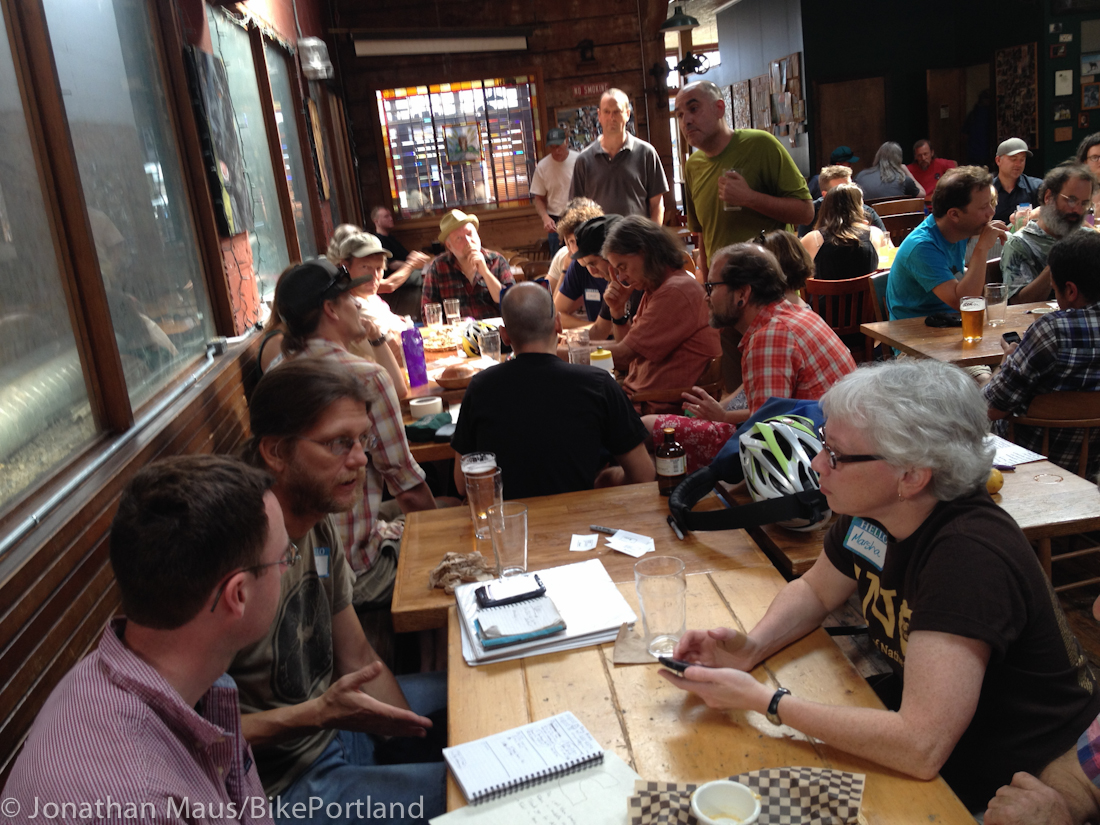
(Photos by J. Maus/BikePortland)
Spurred into action by Portland’s Great Bike Stagnation and a growing realization that this town needs a bike advocacy shot-in-the-arm, a group calling itself BikeLoudPDX held its first ever meeting on Saturday.
Most people were simply fed up with the lack of high quality bicycle access in Portland and the lack of urgency to do anything about it. One man, a 62-year old named Eric (I didn’t get his last name) lives on the west side and said riding a bike through downtown Portland is so scary (“life-threatening” is the term he used) to him that he and his wife Martha (who’s 67 and has a chronic foot injury) drove to the meeting.
Another woman who recently moved here, said during a round of introductions that, “The more I bike in Portland, the less I like it. The shine has worn off.”
By all accounts, it was a huge success. About three dozen people crammed around tables at the Lucky Lab, each one of them eager to share their perspectives and get involved to make cycling better in Portland.
Instead of spending time talking about what’s wrong and what we should do about it, leader Alex Reed focused the meeting on actions. From the minute I got there and had a flyer for an upcoming ride shoved into my hand (by noted North Tabor-area bike activist Terry Dublinsky), till the last conversation I had, the room was full of positive, forward-looking energy.
With so many people, Reed decided to break everyone into three main groups: one to organize the group’s first ride/action, another to discuss the group’s mission, and another to focus on organizational structure (such as, how/if the group should become a 501-c3, remain all-volunteer, and so on).
As I looked around the room, I was happy to see a healthy mix of wily veterans (including BTA Advocacy Director Gerik Kransky) and newcomers. For several people, this was the first bike meeting they’d ever attended.
Here are a few more photos…
Advertisement
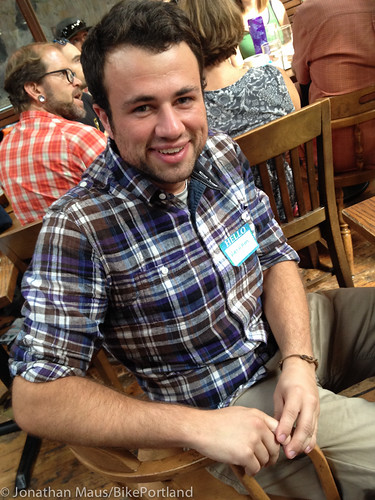
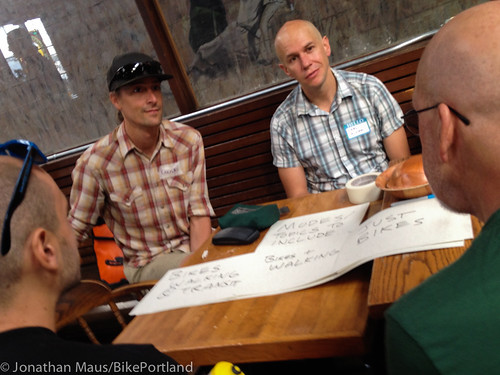
Several themes emerged in the conversations I was part of (and overheard):
— There’s a feeling that any new efforts should work in symbiosis with the BTA; yet remain independent of them. One man, who was involved with Critical Mass in Chicago, said a successful activism group should “refuse to get sucked in” to the bureaucracy or existing power structure.
— The media was a big topic. People want to both focus on changing the dominant narrative in the local media and use new social media tools to organize activism more effectively. One person mentioned using the Internet group Anonymous as a model of powerful and influential “subversive” activism.
— Many people wanted to do more guerrilla actions, such as pop-up protected bike lanes and DIY crosswalks.
— Inclusiveness was another popular theme. Actions the group takes and its organizational structure should be inclusive of all types of people and geographic areas. (I noted out loud during the meeting that the case for inclusion came most strongly from two of the only five or so women that showed up.)
— The group also wanted to do more to encourage bicycling perspectives and representation at project meetings. On a similar note, they want to do more to respond immediately to infrastructure issues and problems as they arise (examples being SW Barbur road diet proposal, the narrow bike lane on Interstate, the ongoing issues of too many drivers on SE Clinton, and so on).
— As for how aggressive a new group should be, that question remains. There was a strong feeling that this group wanted to stop short of pushing the envelope too much, but some expressed that a certain amount of “loud and cranky” bike activists is just what Portland needs.
— While the actions this group takes will draw attention to gaps and safety issues, we also discussed the need to do more celebrating of the good things. Because Portland City Hall has no bicycling champion at the moment, there’s a lack of ribbon-cutting and commemorations to draw attention to major accomplishments (like the one millionth bike trip over the Hawthorne Bridge or the success of the NE Multnomah road diet project.)
— One key overall theme was that bicycling needs a strong voice in Portland. “The bike voice tends to get undermined in infrastructure discussions,” was how one person put it. On a similar note, the BTA’s Kransky said he showed up because he wants to create more bike advocacy capacity. “How we can build more power?” he asked the group.
Like I said above, this group is about action and the first ride is tonight (8/26). Reed has posted details of a Protest Ride on SE Clinton, “to highlight the importance of keeping motorized traffic volumes low on neighborhood greenways / bike boulevards.” The rides will meet at SE 26th and Clinton at 5:15 and 5:45. In addition to riding, people will hold up signs to encourage drivers to use SE Powell instead of Clinton (like PBOT now advises) as the detour during a major construction project on Division.
Reed and others are working toward a short-term goal of getting PBOT to try temporary diverters on Clinton to reduce the amount of driving trips on the street.
To get involved and/or keep tabs on this fledgling group, check out their Google Group or drop Reed an email at bikeloudpdx [at] gmail [dot] com.


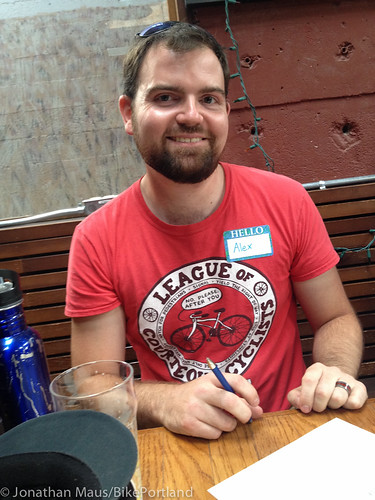
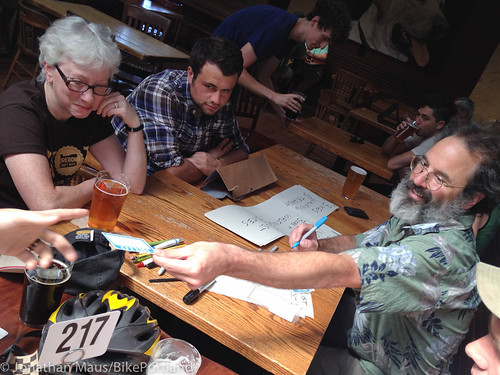
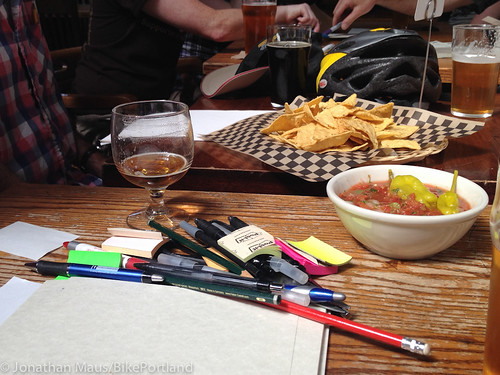

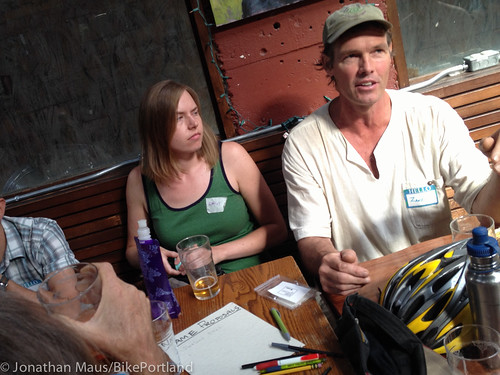

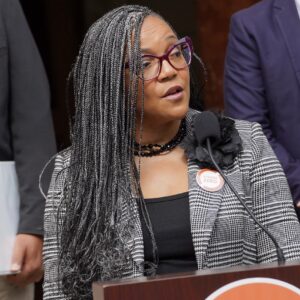
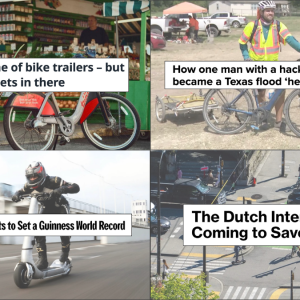
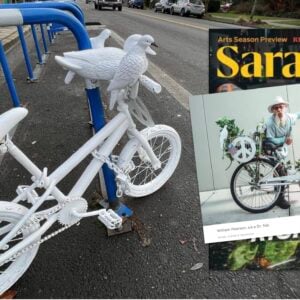
Thanks for reading.
BikePortland has served this community with independent community journalism since 2005. We rely on subscriptions from readers like you to survive. Your financial support is vital in keeping this valuable resource alive and well.
Please subscribe today to strengthen and expand our work.
heard about slow roll?
http://www.slowroll.bike/
How great to hear something positive out of Detroit!
“riding a bike through downtown Portland is so scary (“life-threatening” is the term he used) to him that he and his wife Martha (who’s 67 and has a chronic foot injury) drove to the meeting.”
I utterly refute this, downtown streets are some of the safest streets to ride on.
Traffic lights all through downtown are timed at 12.5 mph, people downtown do not drive quickly because every 200 feet there’s a light that will stop them if they drive too quickly, and most drivers already know this so nobody’s driving very quickly.
There’s nothing dangerous about riding in traffic at 12 mph so long as you place yourself in the center of the lane (rather than splitting lanes or riding right next to parked cars) and ride normally.
This site’s motto is “to inform and inspire,” but I’d argue that it’s hard to inspire people to ride if you’re constantly saying that the streets are too dangerous to ride on. Perhaps if this fellow had a chance to ride downtown with an experienced “guide” he’d change his tune.
Their experience, like mine, is that it IS scary to ride through parts of downtown. I’m glad it’s not the case for you, but inclusiveness – one of the stated goals of this new group – means not refuting the validity of someone else’s experience.
I hear you grumpcyclist… But perception matters, and for many people riding downtown feels too dangerous and too scary. Sure, they might change their tune if they had a guide, but that’s not a realistic option for most people.
It’s easy to talk about taking the lane if you are an experienced rider. But how will we ever encourage more people to hope on a bike if we tell them they have to ride with huge metal beasts that have the capacity to do real harm (both mentally via road rage behaviors and physically).
Calling cars “huge metal beasts” that can cause harm might contribute to peoples fear. It is like telling your kid that all dogs bite and should be feared instead of just using caution. Though I guess it must suck to have the mentality that you could get killed everytime you hop on a bike. Tough way to live
Odd for me to be making this argument because I’m fairly radically pro bike (really) but sometimes Portland cyclists get too precious with their insular views. Even in bikevanas like Amsterdam there has to be a base level of bike skills to ride safely and efficiently. I’ve spoken with Americans (of course) who were absurdly terrified to ride there, sounding like many of those here saying how bad it is in Portland. Want a succinct example? Reading of all those describing streetcar tracks as a nightmare for cyclists in Portland. Well they are everywhere in Amsterdam, really dominating many streets capes in all directions. And while locals will cheerfully help out the inevitable tourists who trip up on them, it’s kind of expected there (by the time you’re maybe 6) that you learn how to ride them. Not rocket science and they are really quite safe.
Those who think it so bad here need to get out more, including places they imagine have eclipsed us – like NYC or even Indianapolis. No offense, but this is almost comical. New Yorkers love bike lanes because it gives them a place to double park their cars, of which their will be 2 or 3 every block. Can it be better here? Of course; much better. But places well past our stage (such as Copenhagen, Amsterdam etc) still require expected basic riding skills, and being terrified in 12mph traffic means you’ve got some work to do on your bike skills. Riding in downtown Portland or say on Clinton is better than ANY other American city our size or larger and many smaller. I ride them; I say this first hand.
Some of this is just not taking responsibility. Learn bike skills. While a world hermetically sealed from motor traffic or the end of motor traffic would be groovy we will have to interact meantime. I know this will be interpreted as “bikes have enough now” but I don’t believe that for a moment. Most Amsterdamers are riding virtually as infants, and we aren’t there yet but that doesn’t give us leave to not learn basic skills and take some responsibility. Many (most) city cyclists worldwide would give their eye teeth to have a street like present load Clinton to ride everyday. If you think riding sucks here you really need to get out more to other cities.
ed,
Thanks for the thoughts. As someone who has been there, I understand your comments about Amsterdam. However, I disagree.
The entire bicycling context (cultural, physical, material) over there is completely different that here in the states.
For one, because we lack the density they have, people have further to bike on average. This is part of the reason why many U.S. commuters have drop-bar, skinny-tired road bikes — just the type that can be easily swallowed up by streetcar tracks. In Amsterdam, on the other hand, everyone rides wide-tired, upright bikes.
I would love to find a way to improve the overall skill level of riders here in the U.S. I think a good way to do that is to require a biking test for adult riders and a vast increase in Safe Routes to School education programs for young people. The key is, how would we fund this? That’d be a huge effort.
My point is, simply arguing that people should just improve their skills and deal with it, doesn’t really help much in my opinion.
Dude, people buy road bikes here because of marketing. Not because they have a long commute. Or of course they think they’re road bikers and race at PIR, etc. But seriously, marketing, marketing, marketing.
I guess I deluded myself into thinking I’d rather commute on a bike that reminds me of the bike I ride for fun. Now I know it’s all marketing!
People also buy road bikes because -and brace yourself ‘cuz this one’s gonna’ be a doozy – they enjoy riding them (sometimes even in lycra!!!). People often do actually like what they like.
It’s super if you and champs ride road bikes as your commuter bikes. I totally don’t care. Seriously, not at all. But speaking as a guy who works in a shop I see a whole mess of people come in and look at completely impractical bikes they claim they want to use just to get to work and some casual weekend riding. If someone comes in and wants an aggressive road bike, clipless pedals and some fugly kit for a commute that is in all likelihood less than 10 miles then I will stand by my first comment that many people, excluding champs and yourself, buy road bikes because of marketing. A commute isn’t a race and it’s annoying when people act like it is.
As someone who worked in shops for a decade (irrelevant, but if that’s what we’re doing…) I’d like to ask you what a commute is and what the general public can ride that won’t annoy you.
“The entire bicycling context (cultural, physical, material) over there is completely different that here in the states.”
I think Ed is pointing out that it is almost completely different here in Portland compared to almost everywhere else in the US! And really is Amsterdam a better comparison than other US cities? I know we in Portland like to think we’re so European, but we’re still in the good old US of A.
Sure we shouldn’t be resting on our laurels, but the histrionics of some in the bike community are a little too much at times. And again, I would like to point out that we are seeing a lot of changes (Foster, 50s bikeway, Williams, Everett, Division, Holgate, etc.). I think people need to stop occasionally and realize what a great accomplishment it is to actually get a lane diet in the US in this day and age.
Sure, those infrastructure improvements are great! Hopefully they are enough to move the needle on how many people ride bikes here. As far as the data show, the percentage of people biking in Portland hasn’t increased since 2008 (Census) or 2010 (City of Portland). That is the main reason I worked on forming this group.
http://bikeportland.org/2013/09/19/census-portland-biking-stalls-for-fifth-year-while-other-cities-climb-94248
http://bikeportland.org/2013/10/30/city-auditor-survey-shows-portlands-continued-cycling-stagnation-96367
If Americans rode as many miles as the Dutch or Danes, we’d have much better biking skills, too.
I think people forget how incredibly shitty biking was in the city they moved from to here. Perhaps they didn’t bike at all. I dunno. It kills me too, Ed.
While you might have a point for someone who is exactly like you, this gentleman and his wife feel unsafe riding through certain parts of downtown. However, they are willing to work and support an advocacy group to improve biking conditions.
IF Portland is to expand bike ridership, a multitude of perspectives have to be considered (many of which are currently ignored). Therefore, their concern is best accepted as a valid viewpoint, and at least investigated as to validity with other potential bikers. (Maybe their view is accurate for the time of day they cruise through downtown.)
Safe, basically, but still may be scary for many people that would ride if the safety of riding there weren’t so dependent upon people having more than basic conditioning and riding skills. Basic conditioning and riding skills are likely about the limit that many people aspire to acquire for the kind of biking they intend to do.
Perhaps if this fellow had a chance to ride downtown with an experienced “guide” he’d change his tune.
I’m pretty sure BikeLoud would appreciate you leading some rides like that, grumpcyclist . Some of your riders will likely need 6-8mph speeds southbound, and probably slower yet for a few westbound downtown blocks. Don’t drop any of them!
“…Most people were simply fed up with the lack of high quality bicycle access in Portland and the lack of urgency to do anything about it. One man, a 62-year old named Eric (I didn’t get his last name) lives on the west side and said riding a bike through downtown Portland is so scary (“life-threatening” is the term he used) to him that he and his wife Martha (who’s 67 and has a chronic foot injury) drove to the meeting. …” bikeportland
I don’t have simple, foolproof suggestions for eliminating the scare of riding Downtown streets for the type of riders that Eric and his wife are, but it seems to me they’re definitely a type of rider that should be listened to very carefully for information that could be invaluable towards conceiving the kind of bike infrastructure ideas necessary to have more people feel good about riding.
Considering his age and his wife’s disability, it’s remarkable that they’re even willing to consider riding. It’s not uncommon for people older or disabled, to outright dismiss any consideration of riding. If Eric and his wife are familiar with cycle tracks, I wonder what their feelings of comfort and safety are, or what they think it may be, riding on that type of facility.
I actually like commuting through downtown every day, and have plenty of bike skills. That being said, I won’t ride through it with my son in a trailer. I think that sorta says something.
Yes, that says it all. If you wouldn’t want to do it with your child aboard, then it’s not a safe enough for the masses of people who like bikes but would never call themselves “cyclists.”
To counter that. I and my 9 months pregnant wife had no issues with her biking up the hill (westward direction off the Hawthorne bridge) to get to the Timbers game a few weeks ago. And she was not moving quickly at all.
Clearly it’s just a person by person perception of risk.
Funny, a woman who I teach with who has been commuting from SE PDX to Beaverton for a couple of years was advised not to commute by bike recently because she has to go through downtown and the increased possibility of being knocked down. Definitely an individual preference, and the risk is too high for some. This sucks.
I think it is perfectly reasonable to be scared of riding in downtown. I feel very comfortable, but I have seen (and heard) drivers jam the accelerator to and brakes racing to the red light. I’ve been honked at for biking 18 mph up fifth avenue. Doesn’t bother me, but I imagine that stuff scares a lot of people. Taking the lane is no panacea, either: A friend of mine has been ticketed for taking the lane–impeding traffic, you see.
“A friend of mine has been ticketed for taking the lane–impeding traffic, you see.”
In Portland? Where exactly?
4th avenue in downtown, of all places. The cop told her she needed to be riding the same speed as traffic. 4th avenue is downhill, though. You can practically coast and hit 12 mph.
“4th avenue in downtown, of all places. The cop told her she needed to be riding the same speed as traffic. 4th avenue is downhill, though. You can practically coast and hit 12 mph.” Karl Dickman
Interesting story. More details on it from your friend that got the citation could help. What reasons she had for being in the lane, relative to other traffic, how fast was she going, that sort of thing. Maybe the reasons for citing were valid, or maybe not.
Incident like this does raise important questions such as how a basic type rider that may not generally ride at the speed of business district traffic, which I believe is 25 mph, should expect to be able to use the street for basic traffic procedures. Procedures such as staying clear of the door zone and transitioning from right lanes to left lanes in preparation for left turns.
you cannot ride 4th at anything other than 12 mph and catch the lights.
As I mentioned above, traffic downtown drives at 12.5 miles an hour because the traffic lights are timed at that speed and the block lengths are so short. If you’re riding at 12 mph you are keeping up with traffic.
“…If you’re riding at 12 mph you are keeping up with traffic.” grumpcyclist
Which does not necessarily answer the question of why, according to him, Dickman’s friend riding on her bike, was issued a citation for impeding traffic. Rarely it would seem by reports of that type citation being issued, do people get cited for impeding traffic while riding independently.
At least to me, that makes knowing some specific details of this particular instance for citing, important before I’m going to believe without further question, someone’s second or third, or even further from the source story implying that people riding bikes are being cited on Downtown streets for impeding traffic.
I don’t think it is appropriate to publish a photo of the email sign up list. I certainly wouldn’t appreciate if it were mine being shown without my explicit consent.
thanks for the comment Jimmy. I’ve blurred out the addresses in that photo.
Needs more blur. I can read them all still.
Having ridden bikes for nearly 15 years in the central city areas for fun and work, the pressing issue I see lately isn’t so much a lack of bike access (though it could be better) as it is growth in heavy auto traffic pretty much everywhere. What infrastructure we do have is less useful when drivers start using it to cut through neighborhoods, and that new bike lane on Everett’s cool but it’s not going to be a bike-only lane for long, what with all the congestion right across that 3-foot buffer. A bike network alongside road-raging cagers is going to suck no matter how much green paint you throw down.
What I’d like to see is a step outside of bike-specific advocacy. Actions like increasing parking fees everywhere that there’s congestion, traffic calming/woonerf-type concepts and better enforcement including permanent speed cameras make the roads safer for everyone (including bikers, walkers and other drivers) and create a cost incentive for drivers to rethink trips. Safer, calmer roads and a perceived cost increase for driving will get more people out of their cars.
I won’t join a confrontational bike-specific protest ride, but I will support a campaign to make our streets human-scale for everyone. Basically, Sunday Parkways > Critical Mass 🙂
I will be riding through as this is my daily commute (orange Tee shirt, blue helmet and black bike with red truck pack) Like Janno, I do not support confrontational behavior and I will observe how the loud crowd represents cyclists.
So what happened to the new upstart Critical Mass ride? That should be tonight but I don’t see it on the Shift calendar.
Critical Mass is not being held this month due to the Super Legal Ride this Fri. It will be back next month.
how about clinton and 21st, thats the busiest intersection on Clinton. I’ll be there but at 630
I’m really hoping that the new group can attract a diverse membership!
I think it depends a lot on which way youre going. Downhill or flat, I can keep up with cars downtown and dont mind sharing a lane with them. Uphill though, I always end up with trucks impatiently tailgating me while I crawl up the hills. And even though *most* drivers know to drive slowly downtown, theres always a few maniacs who have to gun the engine at every light.
I went to the ride tonight. It was fun, well run, and seemed to get the message across. A number of cyclists stopped to sign postcards.
I thought it went well. Nice to meet you Alex and thanks again for putting it on.
What was the “police enforcement” like? Any drivers or cyclists get ticketed?
Reza a couple of neighborhood residents said they saw drivers and cyclists being ticketed for speeding and blowing stop signs. Apparently there were a couple of unmarked police cars about.
Did this group discuss developing more mountain biking (specifically singletrack) and recreational cycling opportunities in state?
Just my opinion here. Getting some support from a group like this for developing singletrack that could be used as part of a larger transportation network (ie. the current dirt paths along both sides of the Willamette that parallel the bike/ped paths could actually be pretty cool) will require someone to get involved and push that agenda. A singletrack system within the city that sorta connects the parks we have (FP, PB, Riverview, etc) could also help with promoting better mountain biking there, as well as other, lesser developed parks/natural areas/etc. An effort like this needs a champion. Hopefully someone with some time and passion will step up.
i would suggest getting involved in your neighborhood assoc. with a specific interest in parks. the city uses the associations to draw people into different parks committees. It’s not going to be glamorous and might take a while, but it’s a start.
I actually didn’t hear anything about that at the first meeting, but of course I can’t be everywhere at once. The group’s priorities will (necessarily) be driven by what its members are passionate about and therefore willing to work on. If people who are passionate about dirt riding make their voice known within the group, then we would probably do stuff on off-pavement issues.
Next ride: Friday at 4pm! Should be in the thick of the detour and the Labor-Day-weekend early rush hour. Woohoo! Meet at SE 26th and Clinton.
It’s sad that cyclists on Clinton have to put up with extra traffic for two weeks in the summer during construction.
I rode Clinton this morning, but I can see why it’s more important to do the Super Legal Ride in the afternoon when the bulk of traffic is eastbound and cyclists are going slower up the hill. That said, even going downhill I got passed by several cars. Fortunately none of them did so dangerously, except the guy in the VW TDI who felt it necessary to pass me while we were still IN the 21st/Clinton intersection. I’ll be there again this afternoon.
One good thing I observed was at least as many cars going straight across Clinton, without turning onto it, as driving up or down it.
I would think the MOST important day to do this ride is next Tuesday afternoon. Right now is we’re in one of the lowest-traffic weeks of the year, but school will be back in session next week, bringing a ton more cars onto the road.
Regarding entity structure (you mentioned 501 c-3 status): Whoever leads this group really really needs to talk to an accountant or CPA who has experience setting up such entities with the state and federal government, and who has experience in the tax returns and requirements associated with them– preferably before anything gets formed. There are a lot of requirements in the initial set-up that get missed and then the 501c-3 status gets denied.
I suppose they could go see a lawyer, but a lawyer will charge exponentially more than an accountant or CPA would– at least in my experience in the accountant/CPA industry.
(I didn’t want to solicit their business here, so am not including info on our firm– but suffice to say we’re in the SW Suburbs and have set up a lot of non-profit and membership organizations, and do the taxes and accounting associated with it.)
I’m not convinced that the group needs to be set up officially at all. I kind of like the Santacon model myself. Who’s in charge? “Santa”. More action, less bureaucracy.
It felt a lot better riding laps on Clinton than it does bitching on BP or being ignored at town hall meetings for that matter.
I agree with you; it sounded like one of the problems this group has with the BTA is the bureaucracy associated– but as soon as you formally form a group, you’ve introduced that very same bureaucracy.
But on the other hand, having some organization in place is also good because then you have some core group of people driving the efforts, updating the social media, disseminating the focused message, etc.
From what I saw at around 5:30 between 21st and 26th (which was nothing) and the comments on this blog, it sounds like the point was made in a civilized manner. Kudos
You say you’ll change the infrastructure
Well you know
We’d all love to see the plan
We’re moving too slow at this juncture
Well you know
We might try to stop the rain instead
But when you talk about Anonymous
Don’t you know that you can count me out
<sotto voce=”John Lennon”> in </>
That was nerdy on any number of levels.